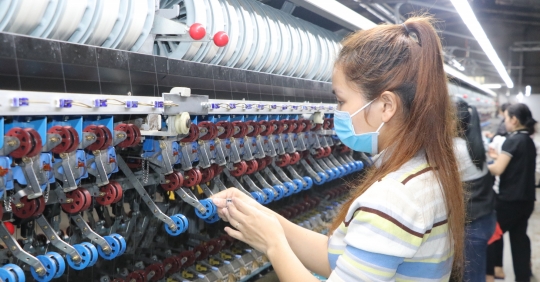The first Yen Bai Silk Factory was built on an area of 2 hectares in Bao Dap Township of Tran Yen District with a total investment of VND 49 billion. In the near future, the factory will launch 2 silk export incubators and create new jobs for nearly 100 local workers.
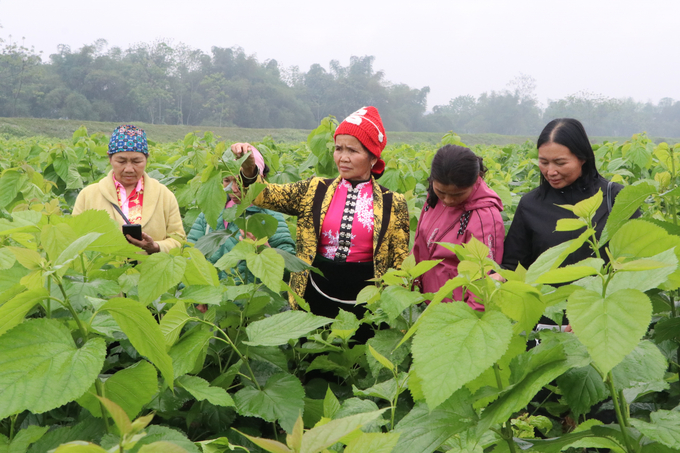
People visit strawberry fields in Viet Thanh Municipality (Tran Yen District, Yen Bai Province). Picture: Than Tien.
Satisfying the desires of mulberry growers who breed silkworms
Nowadays, the working atmosphere in Yen Bai Mulberry Silk Company’s silk incubator factory is very busy and hurried. The silk incubation lines are running at full speed to produce the first shiny rolls of silk. Currently, the factory has installed 2 silk incubators with a capacity of 150 tons of silk/year, equivalent to 1,100 tons of cocoons. Silk products are exported to India, Japan and European countries after processing.
In addition, Yen Bai Mulberry Silk Company is also a unit to connect and introduce units to supply silkworm eggs, silkworm breeding material for cooperatives and silkworm breeding households in Tran Yen District; Technical guidance for silkworm breeders to improve the quality of cocoons. At present, the company has signed a contract to link product consumption with 8 cooperatives in places in the province, especially in Tran Yen district, to cover all products for the people.
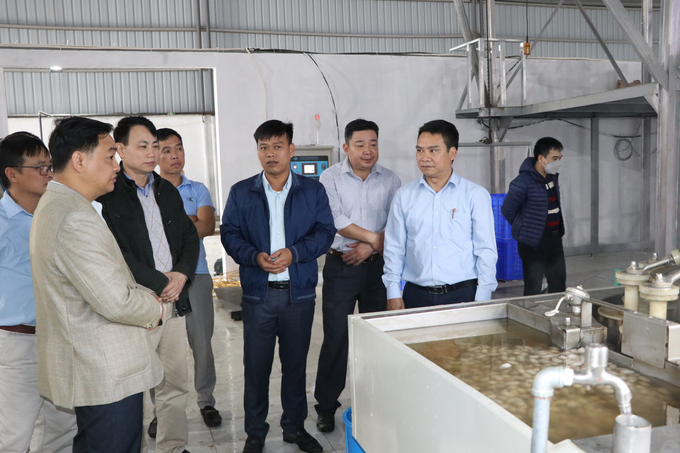
The silk incubator factory has started operations, opening up great prospects for the Yen Bai silkworm industry. Picture: Than Tien.
In order to ensure the stability of the factory’s production, the company bought 15 tons of cocoons from the 2022 summer-autumn silkworm harvest at an average price of 170,000 – 180,000 VND/kg, sometimes class 1 cocoons are bought up to 210,000 VND/kg. kg. This has helped people feel secure in the production and investment to expand the mulberry cultivation area for silkworm rearing.
Ms. Ta Thi Ngoan from Sai Luong Village, Tan Dong Township, Tran Yen District shared: “My family has been involved and connected in mulberry cultivation and silkworm rearing since 2010 and found it to be a very suitable profession for rural people. However, due to the situation of market economy and epidemics, the price of silkworm cocoons has been high and low for years. Cocoon products are mainly made by private traders, so the price is not stable, sometimes even under pressure. Therefore, if there is a silkworm cocoon processing factory in the area, our people are very excited. We have decided to register as a member of the mulberry breeding cooperative to breed silkworms, from which the cooperative will buy all the products and sell them to the factory.”
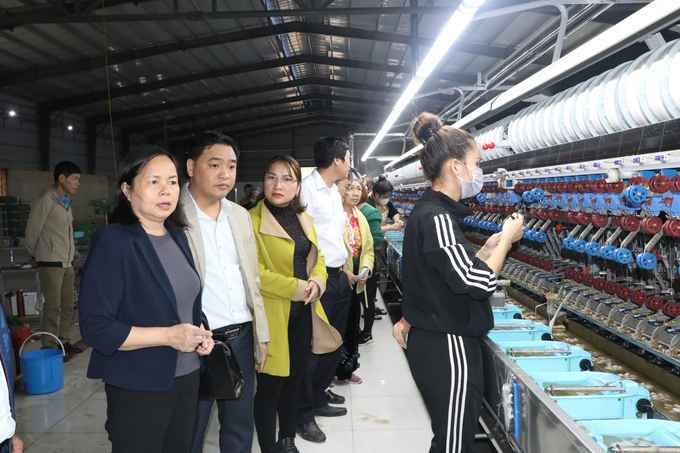
Silk gardening will not only promote the mulberry silk industry but also create employment opportunities for local workers. Picture: Than Tien.
Bao Dap Township currently has nearly 170 hectares of mulberry trees with over 260 households growing mulberries to breed silkworms, mainly in Dong Sam, Dong Danh, Dong Ghenh and Dong Buoi villages. Up to now, there has been a mulberry farming village in Dinh Xay Village in the community, where silkworms have been raised, also 1 cooperative and 18 cooperative groups have been established to cultivate mulberries and raise silkworms.
In 2022, farmers in the commune raised over 12,000 silkworm rings, produced 209 tons of cocoons and brought in nearly VND 30 billion in revenue. In particular, in the area between the mulberry cooperative and the households that grow mulberries and raise silkworms, the community has formed a chain of mulberry growers and silkworms, stably consuming silkworm cocoons for the people every year.
When the factory processing silkworm cocoons is operational, the cooperatives are the intermediaries that connect the farmers to the factory. Mr. Tran Duc Tien, Chairman of the Bao Dap Township People’s Committee, said: In the past, people in the township were assisted by agricultural advisers, trained in techniques for intensive care of mulberry trees, and supported by the state with fertilizer payments, slowly, financial support in order to increase seedlings buy, avoid silkworms, build and repair houses for raising baby silkworms, houses for raising large silkworms…
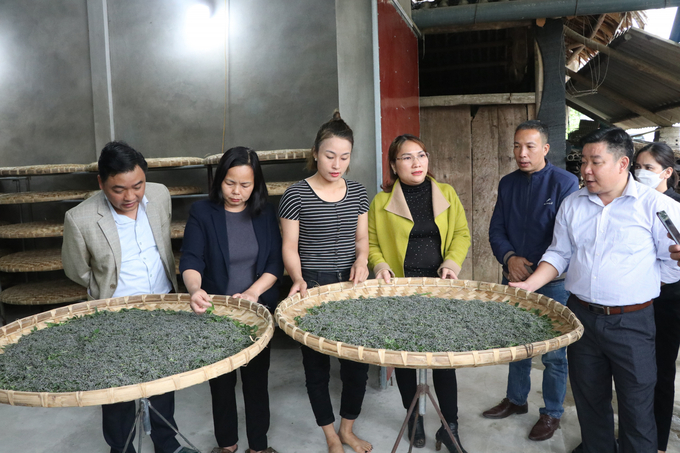
The mulberry farm and silkworm farm in Yen Bai were able to confidently expand their production scale thanks to the start-up of a silk farm. Picture: Than Tien.
To date, mulberry cultivation is the most important industry in agricultural production in Bao Dap Township. In particular, the fact that there is a factory to buy and process cocoons in the area has helped people in the community feel safe to stay with the mulberry tree and thus helped the area continue to develop the area in the near future to expand
Mr. Vu Xuan Truong, Director of Yen Bai Mulberry Silk Joint Stock Company, said, “In order to prepare the factory for operation, the company has provided vocational training and created jobs for 80 local workers. The source of the cocoon material for production is mainly purchased from Tran Yen District and other districts in Yen Bai Province. With the designed scale, the factory can buy the entire number of cocoons from silkworm breeding households in the region. In Tran Yen District, contracts are signed with cooperatives and traders at stable prices. .
Groundbreaking turning point for the mulberry industry
According to the Phase 2 draft, the Yen Bai Mulberry Silk Company factory will install two more silk incubator plants to double its capacity, which means the company needs to coordinate with places in the province to expand, improve the mulberry cultivation area the quality of the labor force, strengthening technical support for cooperatives, mulberry cultivation households to raise silkworms to improve performance and poor quality.
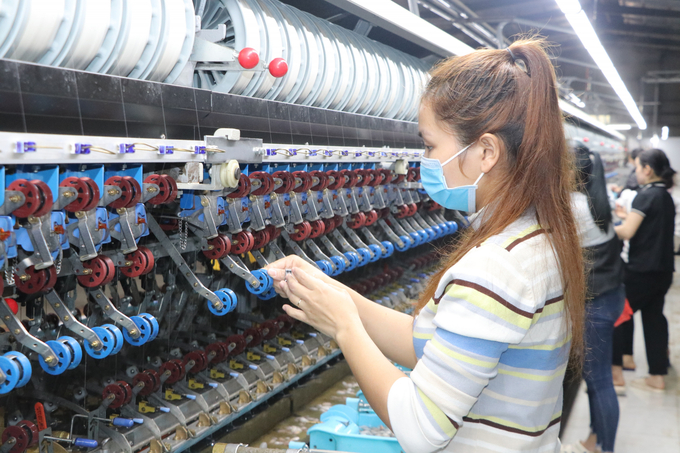
In the coming period, Yen Bai Mulberry Silk Joint Stock Company will continue to train local workers to expand the production scale. Picture: Than Tien.
According to Mr. Vu Xuan Truong, director of Yen Bai Mulberry Silk Joint Stock Company: Through the survey, the average annual production of cocoons in the main mulberry area of Tran Yen District currently reaches about 1,000 tons. However, the quality of the labor source is not high, so the company would like all levels and sectors to work with the company to continue training and improving the skill level of employees.
At the same time, the mulberry cultivation area will be further expanded to breed silkworms, invest in intensive agriculture in the existing areas to increase the yield of mulberry leaves, increase the production and quality of silkworm cocoons. The company continues to contract with cooperatives and private traders to purchase all cocoon products for farmers in the district and neighboring districts. At the same time, you should continue to offer vocational training and hire more local workers for long-term employment.
So far, Tran Yen District has formed a large mulberry-growing area covering over 860 hectares with more than 1,500 households raising silkworms. The production of silkworm cocoons in the whole district in 2022 will reach 1,168 tons, the average product value will reach 200-250 million VND/ha/year..
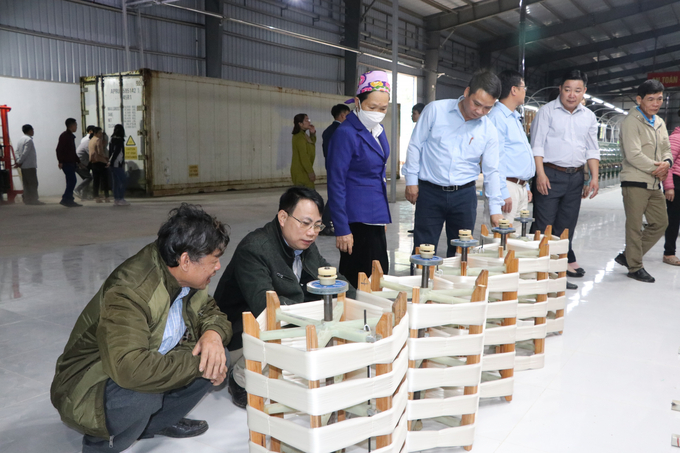
Silk products after processing. Picture: Than Tien.
Tran Yen District has developed a plan to expand production of mulberry cultivation and silkworm farming to 1,200 ha by 2025; maintaining the connection of production groups and households and implementing technical measures in accordance with the right process to ensure efficient production; Striving to produce over 2,200 tons of silkworm cocoons annually, valued at over 300 billion Dong.
In addition, Tran Yen District will continue to create favorable administrative procedures, land and labor conditions to attract silk processing and silk weaving industries.
Mr. Nguyen Van Manh, Deputy Head of the Ministry of Agriculture and Rural Development of Tran Yen District, said, “The annual production of silkworm cocoons in the district is always higher than the previous year due to the expansion of the area and the level of intensive agriculture and application of advances science and technology of farmers. However, in the past, people only sold cocoons to private traders or cooperatives to collect and take them to other places for processing, so the price was not stable. Therefore, the operation of the silk factory in the district is a turning point for the silkworm industry in Tran Yen in particular and Yen Bai Province in general.
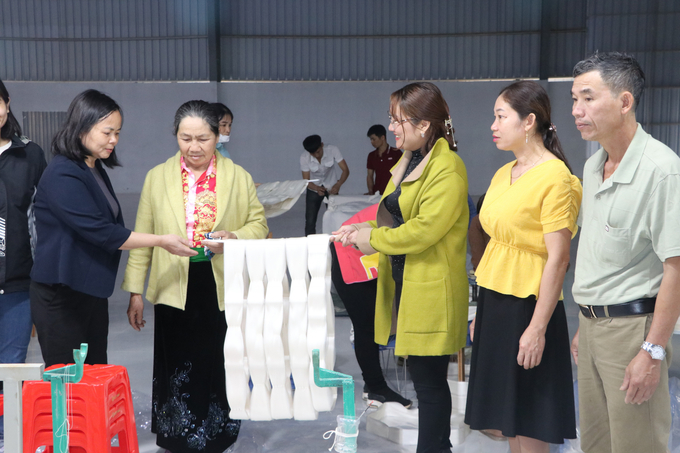
The first batches of silk products after processing. Picture: Than Tien.
Now people can safely expand the mulberry growing area further. In addition, it is also a premise for Tran Yen District to attract more enterprises to the area to purchase and process silkworm cocoon products.

